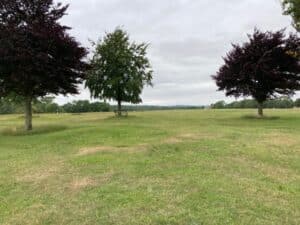Support us from £3/month
We deal with almost 1000 cases a year assisting communities, groups and individuals in protecting their local spaces and paths in all parts of England and Wales. Can you help us by joining as a member?
We have welcomed the decision to abandon plans for a café on the downs in Bristol close to the Avon Gorge. The society criticised the Downs Committee[1] , which put forward the plans, for squandering public money on unlawful and undesirable projects. Meanwhile the committee is failing adequately to carry out its statutory responsibilities.

Bristol Downs. Photo: Open Spaces Society
The Downs Committee was set up by the Clifton and Durdham Downs (Bristol) Act 1861. It has no powers to build or operate a café[2]. The committee hoped the government might make an order to enable it to do so[3]. A recent meeting with government officials made it clear that this was most unlikely.
Kate Ashbrook, general secretary of the society, said: ‘We are delighted that these plans are being abandoned. Bristol’s iconic Sea Walls are a wholly inappropriate site for a café. The cafe would have spoilt the view and sense of wildness over a wide area. It would have brought increased traffic and congestion to an already busy part of the Downs. It was ludicrous to justify this significant development by the provision of four toilet cubicles, fewer than in the unobtrusive toilet block the cafe would replace’[4].
As for the Downs Committee, Kate Ashbrook said: ‘The Downs Committee has a single statutory remit: to keep the Downs open and unenclosed “for the public resort and recreation of the citizens and inhabitants of Bristol”. The 1861 Act gives the committee no powers to build or operate a café. We explained long ago why the committee’s proposal was unlawful. Yet the committee pressed ahead, wasting public money on architects’ fees, planning applications and, presumably, legal advice’[5].
Kate continued: ‘We are glad that the committee has decided to abandon its plans rather than risk another expensive High Court challenge. The challenge to its unlawful licensing of zoo parking on the Downs cost about £400,000, most of it from council tax. The committee needs to focus on improving the Downs for recreation, not on hare-brained schemes. We welcome recent attempts to improve the way the committee works, but they do not go far enough. Major changes in the committee’s membership and priorities are needed if it is to fulfil the vision of its Victorian forebears. They bequeathed Bristol its glorious Downs, with the wonderful and unique Downs Act to protect the Downs, the envy of other cities. They acted to stop building on the Downs, not to promote it.’
[1]The Downs Committee comprises the Lord Mayor (who chairs) and six councillors together with the Master of the Society of Merchant Venturers and six Merchant Venturers.
[2]The 1861 Act requires the Downs Committee to manage the Downs so that it is kept ‘for ever open and unenclosed’. As Gerry Nichols records on page 25 of his booklet To keep open and unenclosed: the Management of Durdham Down since 1861, this ‘has always been interpreted as a ban on permanent buildings on the Downs’. He goes on to explain that the land by the Water Tower owned by the Bristol Water Works Company has therefore been used for buildings to avoid challenges. Apart from the proposed development contravening the general provisions of the 1861 Act, the Downs Committee can operate only using the specific powers it has been given. The committee has no powers to build, except in relation to dressing rooms on the Water Works Company land. For the latter there are specific powers in the Bristol Order 1931. Similarly the Committee has no powers to operate a café.
[3]The Downs Committee approached the Department for Levelling up, Housing and Communities (DLHC) about using powers in the Localism Act 2011 to enable it to build and operate the café. Under section 5(1) of the Act, the Secretary of State can make an order to repeal or amend any statutory provision preventing a local authority doing anything individuals can do. At the Downs Committee meeting on 28 February, the Lord Mayor reported that DLHC officials had been ‘discouraging’. The Downs Committee was not a local authority so the city council would have had to apply on its behalf. The power had only been used once. Making the order would require debate in both Houses of Parliament. The Open Spaces Society and others have anyway pointed out that individuals cannot build or operate cafés on the Downs. There is therefore no statutory provision to amend.
[4]The toilets near the Sea Walls are on the site of a World War II latrine block. This is the only WWII temporary building that the then Downs Committee allowed to remain. The toilets were re-built in 1963. The Downs Committee proposed to replace the block with a café and education booth. The development would have included toilet cubicles open to the public which the café was intended to fund.
[5]The proposed development was first given planning permission in 2019. This permission lapsed and a fresh application proved controversial. At its April 2022 meeting the Bristol City Council development control committee decided not to grant permission and instructed officers to draw up reasons for refusal. In June the committee decided nonetheless to give permission. As well as objecting to the planning application, the society and others warned that the plans were unlawful.
